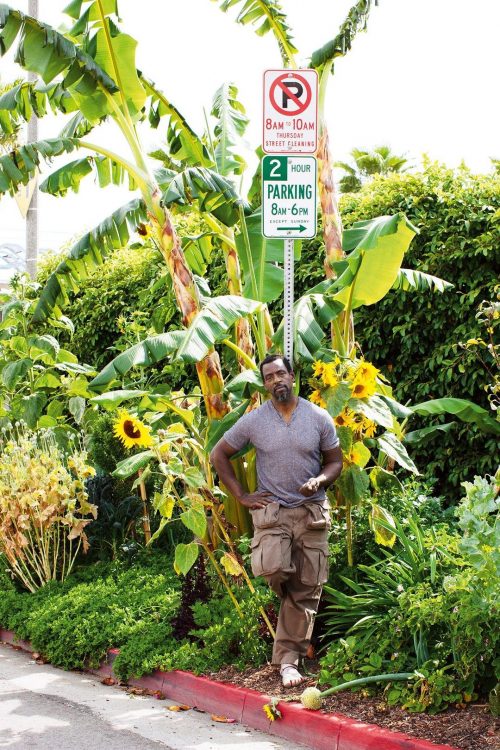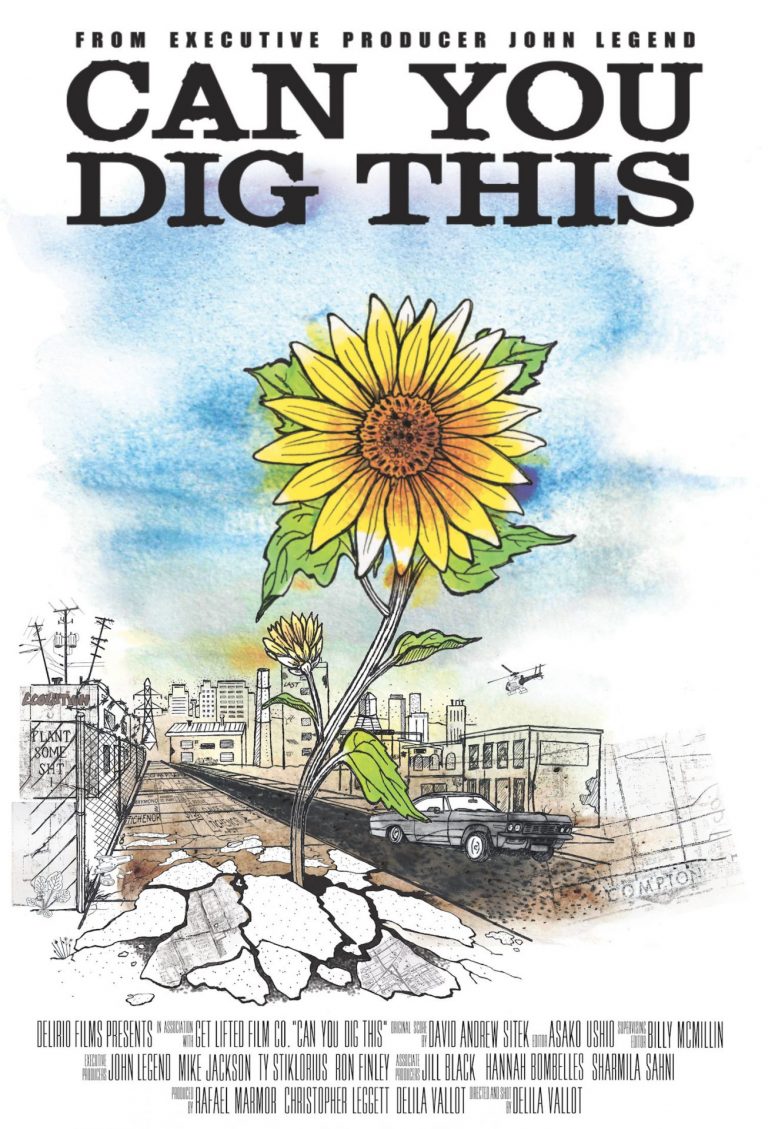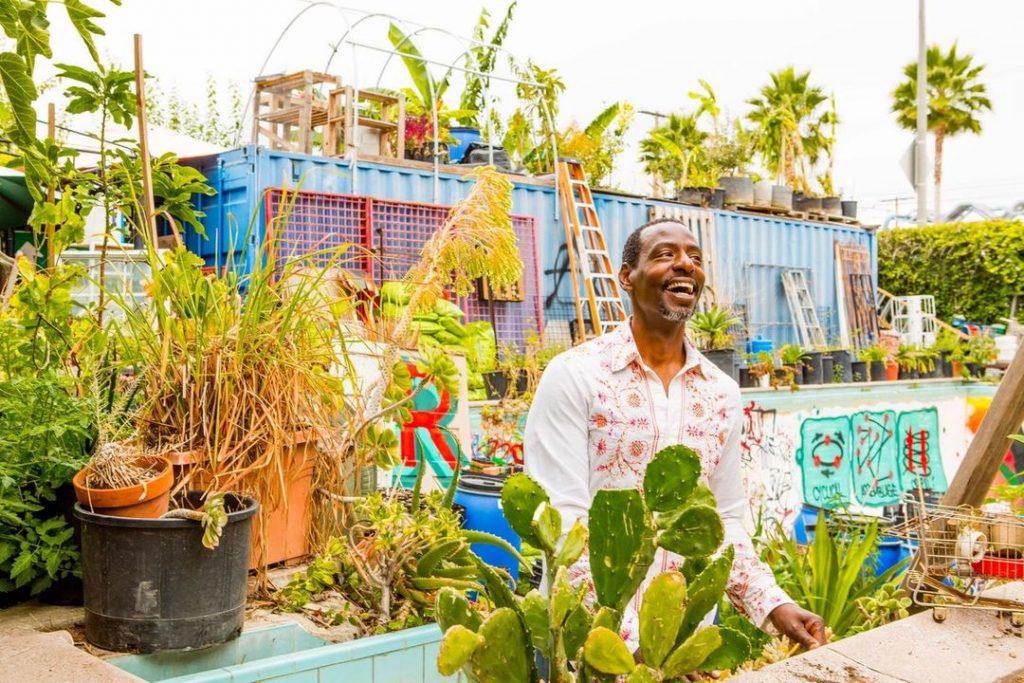Gangsta Gardener Teaches A Community How To Improve Their Health
Originally produced for Arts Help, Summer 2021
Artist and gardener Ron Finley uses soil for his canvas and plants and trees for his paint.
“Gardening is my graffiti. I grow my own art. I beautify lawns and parkways.”
Ten years ago there was a warrant out for the arrest of Ron Finley for the crime of planting food. Finley lives in South Central Los Angeles best known for crippling poverty and gang violence. After the recession of 2008, Finley’s work as a fashion designer dried up and times were tough. There was a patch of unused grass on his parkway, (a small patch of land between the sidewalk and the street), that he was technically responsible for, so he decided to plant a food forest.
But then a neighbour complained and the city descended. So long as it remained dried up grass and covered in garbage, the city didn’t care. However, when he turned it into a garden of banana trees, kale and sunflowers, it was now against the law. Finley refused to back down and with some media attention and a lot of determination he was able to get the law changed. And the Garden Gangsta, as he is now called, was born.
Finley is a charming and incredibly focused activist who isn’t afraid to tell it like it is with colourful language. As a gardener, he is largely self-taught. Though he has managed to make a good living in an otherwise depressed area, he knows how much many of his neighbours struggle to get by, let alone eat healthy food.
As he describes in both his TED talk and on his website, South Central is made up of fast-food restaurants, liquor stores and vacant lots. The obesity rates are 5 times higher than in northern Los Angeles which is only 7 or so miles away. Drop-in dialysis clinics are everywhere. Technically, it is known as a food desert, an area where you have to drive a long distance to purchase healthy food. Over 23 million people in the United States live in these areas.
When Finlay realized that the food available to him, even after he drove 45 mins, was covered in chemicals, he knew he had to grow his own food. That set him on a journey of exploration, learning and community engagement.
On his parkway garden, he would witness people stopping by to ask what he was doing. They had become so detached from what they eat that they didn’t know what food looked like while it was growing. He knew then that a garden could be a tool for education, a tool to transform his neighbourhood. As he describes in his TED talk, children will blindly eat what you put in front of them. Teach them to grow kale and they will eat kale. They are the future; they have the ability to create a more sustainable world. In a article for Vogue by Christian Allaire, Finley states,
“When you learn how to cultivate your own food, that’s freedom,” Finley says. “The way I see it, we are gardens. We are nature. I’m trying to change what people value: what we value in each other, and in humanity.”
In 2010, he and a few other gardeners formed Green Grounds, a volunteer group that encourages community groups to create gardens in their area. Though it’s working, there is a lot of work yet to do.
In South Central, the city owns 26 square miles of vacant lots. That works out to be 20 Central Parks of land that could be put to use for the community. The area has been the victim of active racist development policies (called Red Lining) for decades.
In the June 2021 copy of National Geographic, Alejandra Borunda illustrates in detail how development policies were determined by economic status and race. Northern areas like Hollywood were given parks and tree-lined streets. Southern areas, made up of largely black, Hispanic and Jewish populations, were neglected and no money was allocated to maintain green spaces. In many cases, trees were removed so that the police helicopters could track alleged criminals.
This resulted in a sun-baked neighbourhood of mostly concrete and asphalt that trends 7-10 degrees hotter than Hollywood. And as the climate continues to warm, this will only get worse. The development policy is starting to change, however, trees planted for shade take time to grow. Community food gardens could solve multiple issues from giving people a life off the streets, improving their health, and reducing the temperature of the neighbourhood.
As Finley says, “Gardening is the most therapeutic and defiant act you can do, especially in the inner cities, plus you get strawberries.”
Finley’s message aligns well with the United Nations Sustainability Development Goal (SDG) 10 concerning reducing inequalities and SDG 15 concerning life on land. Social inequality threatens economic development but it also can destroy people’s sense of self-worth. Lack of self-worth can lead to serious health issues and crime.
This is illustrated in the movie about Ron Finley and his neighbourhood, Can You Dig This, directed by Delila Vallot. The movie follows four people who have been encouraged to try their hand at gardening and how it changed their life. In each case, gardening proves to be transformative, giving the individuals purpose and opportunity.
The Green Grounds volunteers continue to educate and transform South Central LA with the community garden programs. Finley eventually created The Ron Finley Project to spread his message of empowerment by growing your own food. He has been incredibly influential both at home and around the world. His TED talk has been viewed more than 4 million times. In 2020, his Masterclass in Gardening came out, amazingly timely during COVID-19 when everyone was trying their hand at growing their own food.
And finally, the fashion designer/gardener has come full circle by creating a line of casual unisex clothes that are of course, perfect for working in the garden. Collaborating with Everybody World, the clothes are sustainably made in Los Angeles from recycled cotton. Proceeds from the sales will be used as fundraising for The Ron Finley Project.
On the Everybody World website, he said,
“There is no trash, there’s only art waiting to happen and that’s what I love about what we have done.”
Many gardeners choose to develop picture-perfect landscapes. But that is not Finley’s style. In his backyard, there is a pool he couldn’t afford to fill and maintain. So he filled it with potted plants instead. Gardening doesn’t have to be expensive, you can grow food in any kind of container and it will still be beautiful.
As he says in an article for The Guardian, “Mother Nature is the greatest artist out there.”
You can read more about and donate to The Ron Finley Project here.
You can rent the movie, Can You Dig This, on AppleTV.
To learn more about and donate to Green Grounds click here.





